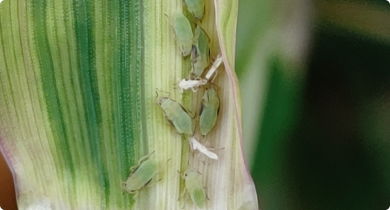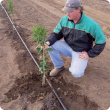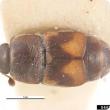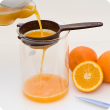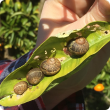Crops
The Department of Primary Industries and Regional Development continues to support the growth and international competitiveness of all crop industries in Western Australia.
With a 2400 kilometre span from its tropical north to its temperate south, WA supports a broad range of cropping industries from rain-fed winter cereals through to irrigated horticultural crops.
In the 2012/13 year the WA cropping industries exported a total of $3.9 billion which comprised: $3.1 billion of cereals, $859 million of pulses, pastures and oilseeds, $142 million of horticultural crops. The major contributors to these exports were wheat ($2.7 billion), canola ($756 million), barley ($377 million), lupins ($42 million), carrots at $48 million, oats ($12 million), and strawberries at $5.5 million.
Filter by search
Filter by topic
- Horticulture (44) Apply Horticulture filter
- Fruit (44) Apply Fruit filter
- (-) Remove Citrus filter Citrus
- Pests, weeds & diseases (22) Apply Pests, weeds & diseases filter
- Plant biosecurity (12) Apply Plant biosecurity filter
- Pests (12) Apply Pests filter
- Biosecurity & quarantine (12) Apply Biosecurity & quarantine filter
- Biosecurity (12) Apply Biosecurity filter
- Diseases (10) Apply Diseases filter
- Pest insects (9) Apply Pest insects filter
- Fungi (8) Apply Fungi filter
- Production & postharvest (6) Apply Production & postharvest filter
- Irrigation (3) Apply Irrigation filter
- Breeding & varieties (3) Apply Breeding & varieties filter
- Pome fruit (2) Apply Pome fruit filter
- Stone fruit (2) Apply Stone fruit filter
- Water (2) Apply Water filter
- Water management (2) Apply Water management filter
- Nursery & cutflowers (2) Apply Nursery & cutflowers filter
- Mites & spiders (2) Apply Mites & spiders filter
- Climate, land & water (2) Apply Climate, land & water filter
- Grapes & wine (2) Apply Grapes & wine filter
- Minor fruits (1) Apply Minor fruits filter
- Potatoes (1) Apply Potatoes filter
- Table grapes (1) Apply Table grapes filter
- Vegetables (1) Apply Vegetables filter
- Livestock species (1) Apply Livestock species filter
- Quarantine (1) Apply Quarantine filter
- Food, export & investment (1) Apply Food, export & investment filter
- Bacteria (1) Apply Bacteria filter
- Avocados (1) Apply Avocados filter
- Bees (1) Apply Bees filter
- Export services (1) Apply Export services filter
- Intrastate movement (1) Apply Intrastate movement filter
- Livestock & animals (1) Apply Livestock & animals filter



